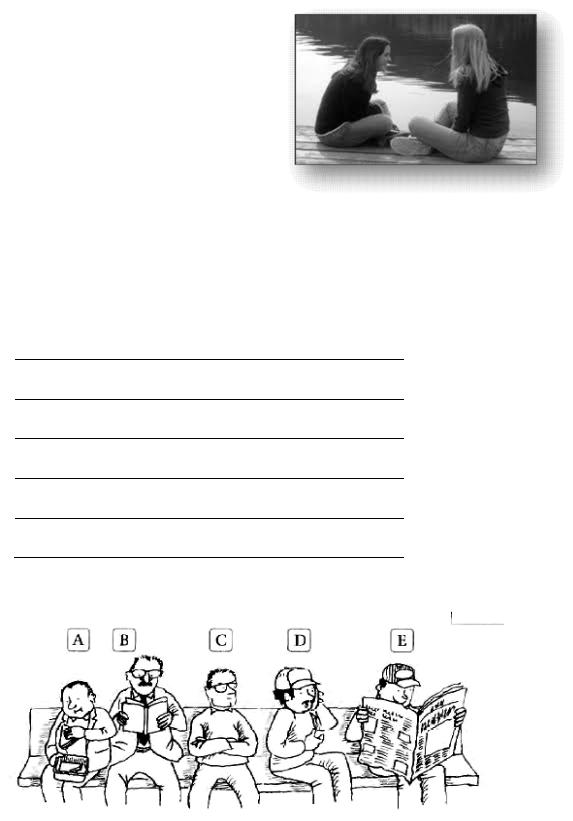
Пособие Борисова (англ для инженеров базовый)
.pdf
39
4. Listening and speaking
4.1 Look at the photo. Do you know who this man is? What is he famous for?
Listen and answer the questions.
a.What is his name?
b.What did he invent?
c.When did this idea come to him?
d.Why is this idea important?
Listen again and make sentences about his life and his invention. Use the following ideas.
a. |
London, England |
e. |
Switzerland |
b. |
Oxford University |
f. |
free to everyone |
c. |
an old television |
g. |
1994 |
d. |
1976 |
h. |
it’s real |
4.2 Think of a scientist/inventor/politician/public figure whose ideas changed the world (in a good way). Tell his/her story to the group. Ask them 6-8 questions to check if they understood you.
5. Reading and vocabulary
5.1 Read the story of Ukhta State Technical University. Make a list of important events. Use the list of the years as prompts.
Years of history
This University is one of the leading higher schools in the north of Russia. It has a reputation for academic excellence and attracts students andresearchers fromall parts of the country andabroad.
The story started in April, 1958, when Moscow's Gubkin Institute of Petrochemicals and Natural Gas opened an educational support centre in Ukhta. The Institute helped with the library and teaching materials. The training system included a combination of professional correspondence courses andon-the-jobexperience.
The development of oil and gas industries demanded more qualified specialists. As a result, theeducational support centre became Ukhta

40
Industrial Institute in March, 1967. The first Rector was Grigory Panov (1929-1988). There were three faculties: Oil and Gas, Forestry and the faculty for evening and correspondence students. In 1969, there were only sixgraduates, but already in 1972, two hundred and seventy-four skilled engineers graduated from the institute. At that time the institute hadfive faculties andtwenty departments.
The number of students and the range of specialities grew every year. In April, 1999 the institute achieved university status. It was renamed Ukhta State Technical University. Now it’s a modern research and educationcomplex andhas great scientificpotential.
a.1958
b.1967
c.1969
d.1972
e.1999
5.2Guess the meaning of the highlighted words. Check it with a dictionary.
5.3Complete the sentences with the words highlighted in the text.
a.Arshavin says the team _____ good results last season.
b.In _____ training you learn your job at your workplace.
c.Canada has a special immigration program for _____ workers.
d.National Express is the _____ bus company in the UK.
e._____ courses are also known as distant learning.
f.A magnet _____ ferrous objects.
g.Students _____ tuition cuts during yesterday’s protest march.
h.Twenty-five Oxford _____ became Prime Ministers.
5.4Cover the text and try to remember at least six facts from the University history.
6. Reading and speaking
6.1 Study the facts about Ukhta State Technical University and answer the questions.
41
UKHTA UNIVERSITY: FACT FILE
Location
Ukhta, Komi Republic
Number of students more than 8000
Faculties and departments
1. Oil and gas fields:
Development and exploitation of oil and gas fields; Drilling of oil and gas wells; Design and exploitation of main oil and gas lines and reservoirs; Industrial safety and environment protection; Oil and gas fields’ machinery and equipment;
2. Geological prospecting faculty:
Oil and gas geology; Geophysical methods, Geoinformational technologies and systems; Mineralogy, Geology, Geochemistry and Geodesy; Geophysical methods of mineral deposits search and development; Mineralogy, Applied Geochemistry, Petrology;
3. Information technologies faculty:
Automatic systems of information processing and management; Information systems in business; Electrification and automation of technological process; Information systems and technologies;
4. Timber faculty:
Timber engineering; Timber fields’ machinery and equipment; 5. Architecture faculty:
Industrial and civil engineering; Heat and gas supply and ventilation; Water supply and sewerage; Architecture;
6. Economy and management faculty:
Finance and credit; Economics and management (in fuel and energy complex fields);
7.Faculty of humanities: Public relations;
8.Institute of physical training, sport and tourism Physical culture and sport
9.Faculty for correspondence students
Branches
Usinsk, Vorkuta
Degree levels
Bachelor’s, Master’s, Doctoral
42
Research
12 scientific schools
Conferences
10 annual scientific conferences and seminars for students and researchers
International ties
Bodo University, Norway; Regensburg University, Germany; Arctic University, Finland, etc.
a.How many students study at this university?
b.How many faculties are there?
c.Does this university train IT specialists?
d.What other areas does this university provide training in?
e.Where are the university branches?
f.What degree programmes are there at this university?
g.Can undergraduates take part in scientific conferences and seminars?
h.What foreign schools does this university collaborate with?
6.2Make sentences about Ukhta University. Use the following phrases and the fact file from 6.1.
The university consists of..……..
There are ……… at this university.
……trains ……
……provides training ……. The branches are ……
……take part in……
……study ……
……has internationalties with……
……take place ……
This university has ……
……collaborates with……
……includes ……
6.3 Make an oral presentation of Ukhta State Technical University in class.
7. Writing
7.1 Read this article. Which idea from 1-7 did you follow when you chose this university? Check the meaning of the highlighted words with a dictionary.

43
Choosinga university:ideas for school leavers
Every course and every university is different, and each student wants different things. Do you want the best course? Do you want the ideal work placement?So how do youchoose a university?
1. The choice of subject and type of course narrows down the number of possible universities. If you want to study the Burmese language, there is only one place to go. If you are interested in one of the major subjects such as English, chemistry, law or mechanical engineering, there are hundreds of courses.
2. Going away to university and living at home give you rather different experiences. Living far away from your parents and your home town, you are free to study and socialise when you like. On the other hand, it is expensive. Youalso have shopandcook for yourself, andthere is no comfort of home.
3. Another important factor is the tuition fees. Generally, the central and prestigious universities are more expensive. Some very popular degree programmes cancost more money.
4. Old universities do more research and offer more traditional academic courses. New universities can be more locally and practically orientated and trainmorepart-time students.
5. Universities can be different in size, from fewer than 2,000 students to over 30,000. A small university is more personal and does not have many facilities and non-academic activities; in a big university professors can give lectures to hundreds of studentsat a time.
6. University facilities are can be very important. All universities have a library, a sports hall, a health service, and so on. But there are differences and if you want to play hockey at university, for example, you have to check out, if the universityhas a hockeypitch.
7. You can also often take a virtual tour of the university. Departments usually have their own sites, too. You can find information about courses, options, teaching methods and assessment. A personal visit can also be very helpful. You can get a feel of the atmosphere of a university. Don't forget about opendays for school leavers.
Goodluck inchoosing the right course andplace.
44
7.2Match the sentences and the paragraphs 1-7.
a.Small universities usually don’t have many facilities.
b.You can get information from the internet or visit the university yourself.
c.Living away from parents can have its pluses and minuses.
d.You can find more traditional courses in older universities.
e.If a subject is popular, there are many courses of it at different universities.
f.Tuition fees in prestigious universities are usually very high.
g.If you are interested in some specific activities, you have to find more information.
7.3Read the article again and make a list of seven tips for school leavers about how to choose the right place to study.
OVER TO YOU:
1.Can you describe what you did yesterday?
2.Can you describe the courses and structure of this university?
3.Can you speak about the history of this university?

45
Module 6
MY LIFE AS A STUDENT
Do you like being a student? How much spare time do you have in a day? Do you have time for sports (TV, friends, hobbies)? Do you have a job?
1. Pronunciation and vocabulary
1.1 Listen and underline the stressed parts of the words. Repeat the words.
campaign attend lifestyle seminar pressure discipline involved lecture independent
1.2Complete the sentences with the words from the box. Listen and check.
a.I _____ English and German classes twice a week.
b.We have to prepare a presentation for the next _____ in History.
c.Sometimes I feel too much _____ because I have to study and work at the same time.
d.First-year students get _____ in university sport activities.
e.A new antidrug _____ starts this month.
f.When is the next _____ on Physics?
g.I like active _____.
h.Ukhta Industrial Institute became an _____ higher school in 1967.
i.My _____ at university is different from school.
2. Reading and vocabulary
2.1Read four interviews with first-year students. Answer the questions.
a.Who has no problems with self-discipline?
b.Who is independent from his/her parents now?
c.Who has to read a lot of books.
d.Who takes part in student projects?
Paloma,St.Martin’s school of art:
I’m from London, and my mum decided that I had to leave home and learn to be independent. So, now I’m sharing a flat with four friends in Oxford. My lifestyle is not really normal, because I’m a dancer. It’s all about personal training, so I have to attend classes sevendays a week.

46
Christian,medical student,Stanford:
I’m in my first year, and I’m working really hard. This week, for example, I’m getting ready for my Friday seminar in Anatomy and I’ve got five textbooks to read! I also have time to do non-medic things –play my guitar, or take part instudent political campaigns.
Jessica,engineeringstudent,Sheffield:
I think I’m more organized and self-disciplined than other students because I’m continuing my basketball training at university. I decided that living in halls is not for me, so I’m living in a house with three people from my basketball team. There is a lot of pressure because I have to combine my studies and training, but I’menjoying my life right now.
Colin,IT student,Leeds:
I spend almost all my time at my computer, and always did. I can be really nerdy sometimes. Building professional skills is demanding. I try to get involved in IT projects for first-year students. The only problem is self-discipline – if I work during the night I canskip a lecture or two inthe morning.
2.2Find sentences in the texts which mean the same.
a.Becoming a professional takes a lot of work.
b.In my flat there are four more people, and we pay for accommodation together.
c.Sometimes I can think only about my studies and don’t do anything else.
d.Individual training is everything for my profession.
e.I don’t like living in student halls.
f.I try to take part in student projects.
g.I sometimes don’t attend morning lectures.
h.It’s very difficult to study and do sport training.
2.3Complete these sentences about yourself.
a.I’m sharing a _____ with _____.
b.I have to attend classes _____ a _____.
c.I’m in my _____ _____ at university.
d.I have/don’t have time to take part in _____.
e.I think I am/am not _____ and self-_____.
f.I think _____ is not for me.
g.I spend almost all my time _____.
h.I try to get involved in _____.

47
3. Grammar
3.1 Read and listen to a part of Paloma’s conversation with her friend. What is missing?
Friend:How’s London?
Paloma: I’m not ____ in London now. I’m
____in Oxford.
3.2What is missing from these sentences?
a.Paloma: I ___ ____ a flat with four friends in Oxford.
b.Christian: This week I ___ ____ ready for my Friday seminar in Anatomy.
c.Jessica: I ___ ____ my life right now.
3.3Listen to the short conversations and complete the sentences.
-What ___ you___ ? –I___ ___ my hair.
-What ___ he ___? – He___ ___ TV.
-___ I ___ in your seat? –Yes, you___!
-___ you___ to the radio? –No, I___ not.
-___ the train___? – Yes, it ___.
3.4Look at the five men in the picture. What are the men’s names?
Alex iswearing glasses.
Nick isn’t eating.
Peter isn’t talking on the phone.
Johnand Nick aren’t wearing hats.
Alex andBill aren’t reading.

48
Complete the sentences.
a.Nick _________ a book.
b.John _________ on the phone.
c.Bill and Peter ________ glasses.
d.Bill and Peter ________ hats.
e.Peter ________ a sandwich.
f.Alex _________ a hat.
3.5 Describe the picture. What are the people doing? Write sentences.
1. (bark) - The dog is barking.
2. (cry)
3. (argue)
4. (walk)
5. (play)
6. (eat)
7. (jog)
8. (read)
Now cover the words on the right and try to remember the sentences.
3.6 Listen to the description of a picture and draw it.
4. Listening and grammar
4.1 Nigel and his family are on holiday. Listen to the telephone conversation between Nigel and his colleague, Bill.
Complete Bill’s questions. Listen again and check.
